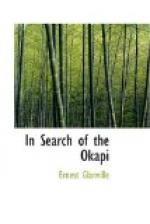It was not a pleasant companionship, and Compton, after a long attempt to stare the reptile down, turned his back to it and watched the efforts of several large moths to get at the light through the mosquito curtains. He could not so much see them as hear them, from the way they bumped into the net, and the little soft splash they made as they dropped into the water. By-and-by there came another sound, made by some large fish, who had also been attracted by the light, and then by the fat moths.
The news that these were good eating quickly spread under water, and presently there was quite a gathering about the boat. Then Compton turned to look at his unwelcome watcher. He was still at his post, his eyes still fixed in an unwinking stare, but seemingly brighter than before. Yes, he was evidently nearer. He was moving! Compton picked up the boat-hook with its dagger-ended spear, and prepared for the attack. Slowly, almost without a ripple, the reptile slithered into the water; then came a rush, a snap of jaws, a swirl of waters, and something heavy and wet came right through the mosquito nets, landing in the well of the boat with a tremendous whack.
“Look out,” yelled Compton; “keep out of his reach.”
“What the dickens is it now?” roared Mr. Hume, as a series of resounding thwacks arose out of the well.
Compton drove his harpoon into the well, and held on like grim death, as the impaled thing lashed out to free itself.
“A crocodile!” he shouted. “I can’t hold him down much longer.”
“Crocodile be blowed!” shouted Mr. Hume, unhooking the lantern and directing its light into the well. “It’s a fish.”
“But,” said Compton, “I saw the crocodile. It came straight for the boat. Venning saw it too.”
“It was over there,” said Venning, peering into the dark.
“Then the fish must have jumped aboard to escape the crocodile. Anyway, we can have fish-steak for breakfast,” and Mr. Hume quieted the fish with a blow on the head.
“I made sure it was the crocodile,” said Compton, in an aggrieved tone. “Look at the hole in the curtains; there’ll be tons of skeeters aboard.”
“You turn in and I’ll smoke,” said the hunter, who smoked enough for three; and, with his pipe filled and lit, he took up the watch.
Once more the little party settled down to pass the night, and this time there was no disturbance until, in the chill of the early morning, the sleepers were awakened to get in the awning, to make all shipshape aboard, and to prepare breakfast. The fish was not handsome-looking, but he cut up into really good steaks, which were grilled on a gridiron fitted over the stove, and, with hot coffee and a biscuit apiece, they ate a meal which made them proof against the depressing surroundings.
Both Compton and Venning, as soon as there was light enough, took a careful look around for the crocodile; but though that wily brute was probably near, he did not show himself. They could, however, see the track made by the hippo when he had broken through into the water, and Mr. Hume, stepping ashore, went up this track to spy around. He returned with the report that the natives were signaling from village to village by columns of smoke sent up from fires fed with damp wood to make a heavy smoke.




